Christmas

One of the dominant dogmas of the season seems to be both loud and clear: Our value as human beings is often dictated by our capacity to contribute toward economic growth.
This is what happens when Decemberism crucifies Christmas.
One may define “Decemberism” as a state in which the value of human life is determined exclusively by our personal rates of production and consumption. We notice this condition most often, of course, in December. Decemberism is the predominant religious tradition of the so-called “holiday shopping season,” and the significance of Christmas is consistently crucified as a result. As Victor Lebow states:
“Our enormously productive economy … demands that we make consumption our way of life, that we convert the buying and use of goods into rituals, that we seek our spiritual satisfaction, our ego satisfaction, in consumption … we need things consumed, burned up, replaced and discarded at an ever-accelerating rate.”
In striking contrast to the Christmas ramifications of God’s incarnation, to be a human of any value in our current context is closely connected with supply and demand, even if it all leads to our personal and public self-destruction.

Wizards! Caspar! Melchior! Balthasar!
Why fly straight to Fox Herod? Through
Unbounded night—! Bringing only news
Ripe for bloodletting. How black a star
You follow. Herod knows. How bizarre
A kingly claim. Will he oppose? Muse
Like Mary? Ha—! Mothers’ sons lose
Heads to swords & axes. Herod bars
The throne to Jesus. Who kills first?
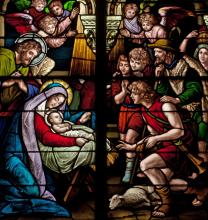
I CONFESS THAT I do not often use the Revised Common Lectionary. As a Bible professor, I prefer to read texts in their larger literary and historical contexts. When a brief reading from one time period is lifted out of its context and juxtaposed with another written many centuries later, it can feel like an invisible hand is forcing me to compare apples and oranges—or even apples and mushrooms.
Nevertheless, I have been enriched by this year’s readings for Advent and Christmas. My “larger historical context” has become the sweep of a thousand years of Israelite history, from King David to the birth of the “son of David.”
For Christians, the coming of Jesus was a singularity. Though we focus on his birth in this season, that lower-class event was barely noticed at the time, and it is not mentioned by two of our gospel writers. It is his entire life, ministry, death, and resurrection that echoes throughout the ages and ushers in our hope of salvation. Our prophets and psalmists from the Hebrew Bible could not foresee details of the Christ-event from their perspectives centuries earlier. Yet their intuitions and hints and poetic expressions of joy over God’s in-breaking from their times are now borrowed to give voice to our exultation over Jesus’ coming today.
In a culture measured by quarterly profits and immediate gratification by credit card, we need a longer view to better understand what God is doing throughout human history. These Advent readings call us beyond the present to the millennia of the past and the hope of the future stretching to eternity.

INVITATIONS COME. Yet an expressed desire for your presence does not guarantee your willingness to show up. Invitations require a response. Some responses indicate significant commitment beyond “just showing up.” A summons may first entail an RSVP indicating a commitment to actually take an active part in the opportunity.
Such is the case for the people of God. Invitations arrived inviting God’s people to be witnesses to the power and presence of a particular God and to become a people who practice justice and favor kindness—peculiar expectations for an ancient culture, for any culture. A requirement of this sort unsettles the status quo of cultural mores where religion represents polytheistic attributions to a type of celestial Santa Claus or divine ATM, or where religion has been privatized—set aside from public prophetic witness to meditative reflection in the privacy of our own homes with occasional festive gatherings. Such genie-worship and privatization results in a deafening silence among the people of God. As Pope Francis put it recently, “a privatized lifestyle can lead Christians to take refuge in some false forms of spirituality.”
The promises that God calls us to are promises that Michael Frost, in Exiles, calls dangerous. They accompany dangerous memories that make a dangerous critique of society.
Over the next five weeks, the invitations extended in these texts indicate more than increasing the head count of seekers of spirituality. They require a response that signifies a commitment to participating in a community whose primary purpose is to expose the dangerous promise of God.

Now that Dec. 25 is over, the real war on Christmas can begin.
Because, you see, that other “War on Christmas” that begins in late November and ends on Dec. 25 is a manufactured war. That war is fabricated by a television network that, despite the Bible’s repeated message at the birth of Christ to “not be afraid,” wants Christians to live in fear of some secular agenda to destroy Christmas. After all, there’s nothing like fear and a manufactured war to raise television ratings.
That’s a manufactured war because, as Diana Butler Bass has brilliantly pointed out, the season from late November to Dec. 24 isn’t Christmas. It’s Advent. If anyone were waging a war on a Christian season during the early part of December, it wouldn’t be on Christmas. It would be on Advent.
The real war on Christmas begins on Dec. 26, but no major television network will tell you about it. The real Christmas season, known as Christmastide, begins on the evening of Dec. 24 and lasts 12 days, ending on Jan. 5.

We’ve created a Christmas monster: a grotesque assemblage of pagan, Christian and capitalist symbolism into something that resembles something we’re both attracted to and repulsed by at the same time. We’re fueled by an admixture of both guilt and greed, while the domestic economy pins its annual hopes on our propensity for spending far more than we have or want to spend.
All in the name of baby Jesus.
It seems that we have no means of escaping the vortex of materialism, partly because whoever is the first not to buy gifts is the cheap jerk who throws the whole transactional nature of gift-giving out of whack. But one Christmas, a few years back, my wife, Amy, and I had finally reached our limit. We were in the midst of our Financial Peace budget slim-down and Christmas spending was an obvious target.

A generation or two ago, when America’s Muslims were new immigrants who made up an even smaller minority of Americans than they do today, they viewed the lights, trees, carols, gifts, and festive spirit of Christmas as a threat to their children’s Islamic faith.
But these days, a growing number of Muslims celebrate Christmas, or at least partake in some ways, even if they don’t decorate their homes with trees and a light show. Indeed, many Muslim families have created their own Christmas traditions.
“I teach my three children, who attend public school and happen to be born into an interfaith Christian-Muslim family, that we absolutely do celebrate Christmas because we are Muslim,” Hannah Hawk of Houston wrote in an email. Rather than putting up a tree or lights, “we celebrate the reason for the season, Jesus, by studying all that is written about him in the Quran and by examining historical theories.”
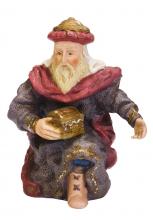
Every year, a chorus of Christians join together to bemoan the “War on Christmas,” lambasting their enemies for taking Christ out of Christmas, and yearning for the days when everyone remembered the reason for the season.
But have we all forgotten? There has always been a war on Christmas. In fact, conflict lies at the very heart of Christmas. To those who say that Christmas is all about peace on earth, a quick look at the second chapter of Matthew and the largely overlooked story of King Herod reminds us that this peace comes at a price. For it is the kind of peace that can only come through conflict. Before caroling, there was weeping in Ramah.
It’s no surprise that most Christmas pageants leave out the Herod story. King Herod jealously guarded his power, killing anyone who got in his way. When he learns of Jesus’ birth, he declares the first war on Christmas. Herod doesn’t just want to kill Jesus. He wants to destroy him, taking Christ out of Christmas once and for all. When his efforts are thwarted, he resorts to genocide to ensure Jesus’ demise, murdering every male infant in Bethlehem. This, for Herod, is a bargain to rival any department store sale: The lives of Bethlehem’s youngest? A mere pittance for unrivaled power.
In other words, Herod gets it. Herod, more than anyone else in the story so far, sees this poor, refugee child for who he really is — a rival king.

We are all hypocrites. I am a hypocrite. That guy over there shoveling his driveway is a hypocrite. You have most likely been a hypocrite at some point. Liberals, conservatives, Christians, and atheists — all hypocrites. This is not so much a statement of judgment as it is a statement of human nature. It is unavoidable and so wonderfully human. All of us have double standards and fail to practice what we preach, simultaneously looking down on others who do the same thing.
That being said, I am about to criticize something in which the act of criticizing will itself be an act of hypocrisy. I am criticizing the vast swarm of words, opinions, responses, and re-posts that have a tendency to take over the Internet and our modern-day consciousness. So now I will simply add to the chatter (though for your sake, hopefully briefly) and then depart to spend at least one day, God-willing, in some form of peace and quiet before Christmas, because really that’s why I’m so perturbed. It seems as if we are in a rather confusing tale about two Christmases.
There is one Christmas as celebrated by orthodox Christians in which we rejoice in the birth of Jesus into a manger, coming not as king, but as beggar and blue-collar worker, born amid dung and hay, eventually coming to signify and proclaim the reconciliation of heaven, earth, and nations, and trumpeting peace, joy, love, and life.
There is another Christmas that is on the surface very similar looking — the Christmas in which pundits on both sides use the day of Christmas as fodder to further their political, ideological, and religious views and people bludgeon each other to death with action figures.

Ah, Christmas! The most wonderful time of the year. A time to gather with family and friends, and, with a smile on our faces, pretend we aren’t quietly measuring who received the best present and which relative really, really needs to stop drinking. A time to hang tinsel and baubles from the tree, and a time to hang up our hopes of losing that last 10 pounds this year. Such a joyous season!
The real point here is that Christmas is what we make of it. For Christians, however, there are some very specific things you can’t do if you want to actually honor and follow the person we celebrate this season. So, I give you my “10 Things You Can’t Do AT CHRISTMAS While Following Jesus.” As with my other “10 Things” lists, this is not intended to be a complete list, but it is a pretty good start.

As we move into the Sundays following Christmas and begin to anticipate Epiphany, we face the terror of the coming week’s Gospel reading, the Massacre (or Slaughter) of the Innocents. While there are a number of stories in the Bible that are difficult to read/hear, Herod’s murdering the innocent children of Bethlehem in his attempt to kill a potential threat to his throne must be among the top.
Herod’s brutality is legendary. Most of what we know comes from the Jewish historian, Josephus. Matthew records that Herod became distraught when he learned from the Magi that an astrological sign had indicated the birth of a Judean King (2:1-8). When the Magi did not return to report the location of this newborn King, Herod realized that he been tricked and “he was infuriated, and he sent and killed the children in and around Bethlehem who were two years old or under” (2:16). While scholars debate whether this event is historical or not, it is certainly consistent with what we learn about Herod from Josephus.
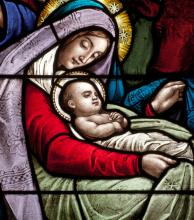
If there is indeed a “War on Christmas,” those on the anti-Christmas side of the war have lost — big time.
The television pundits, conservative politicians, and talk-radio loudmouths who believe there is a “War on Christmas” should look around, withdraw their troops, and quit screaming. Because if there is a war on Christmas, Christmas has won.
As Christmas approaches, tens of thousands of churches around the country are planning Christmas services and expecting packed pews. Their choirs are rehearsing Christmas music; and church members have taken the Nativity scene figures out of storage and put them on church lawns. Children costumed as kings and shepherds are learning to sing “Away in the Manger.”
Christmas cards with manger scenes are speeding around the country through the U.S. Postal Service or in the form of online animated greetings that play “Silent Night” and show the wise men following the star to Bethlehem.
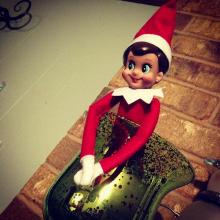
It’s taken me a few years, but I’ve decided to relax about him. I refuse to beat myself up over his presence anymore. He’s okay. I mean, don’t get me wrong — he’s annoying and I have concerns. And I know that many of my fellow parents will disagree, and that’s okay. This makes me cringe, but that little Elf on the Shelf can stay.
After some debate, my wife bought the Elf on the Shelf in 2010. If you aren’t familiar with the Elf on the Shelf myth, it goes something like this: Apparently Santa is incapable of knowing if children have been bad or good on his own, so Dec. 1 to Dec. 24 that Jolly Old Elf sends his little elves to houses to spy on boys and girls. Their job is to check to see if children are being naughty or nice. So, each morning before anyone is awake, our Elf flies in from the North Pole and hides in a different spot in our house. When our children wake up — noticeably earlier in December than any other month — they look for him. Yup, it’s hide-and-seek every morning with the Elf. Then, the National Security Agency Elf spies on our children throughout the day. When our children fall asleep at night, the Elf flies back to the North Pole to provide Santa with a report on how our children have behaved. Then the Elf promptly flies back to our house, hides in a new place, and the morning hide and seek ritual begins again.
Truth be told, my children love it. They. Love. It. They can’t wait to wake up in the morning and search for that little Elf.
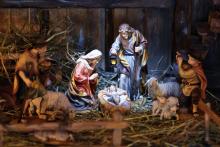
Last December, I decided to run after dark and entertain myself by running through neighborhoods, looking at lighted Christmas decorations as I passed by. It was a novel twist on my regular exercise, and I enjoyed gazing at the beautiful, the creative, and the tacky alike.
Then, I started noticing the insides of houses, too. The Christmas trees were lit and decorated; the insides of the houses seemed warm and inviting. Suddenly, instead of an independent adult on a crisp winter jog, I felt more like a homeless orphan from a George MacDonald Christmas story looking in at something I did not have and of which I could not be a part. Needless to say, the run lost its sense of adventure.
Recently, it has struck me how strange the situation was, both in what I saw Christmas to be and in my decision that I “didn’t have it.”

Nearly one in three Americans, including many with no little children at home and those with no religious identity, say they pretend Santa will visit their house on Christmas Eve.
Overall, 31 percent of U.S. adults play up the Santa role in their holiday season, according to a survey released Wednesday by the Pew Research Center.
Jesus, however, is still the star of Christmas.

There is certainly a warm, nostalgic feeling about the Christmas season. Social media fill up with pictures of Starbucks holiday cups and we get the play-by-play of Christmas trees being purchased and filled with homemade ornaments. Holiday parties become about as frequent as breathing and there is a general sense of camaraderie among people who wouldn’t otherwise interact.
As a local practitioner and neighbor, I’d even go as far as saying this season brings about the most opportunity for new relationships and shared life in the realities of everyday.
Last week I was talking to my 3-year-old daughter about Christmas. She knows we are going to see grandparents and cousins and even knows a thing or two about gifts being exchanged.
And then I asked her, "Whose birthday do we celebrate on Christmas?" With a big smile, she said, "Santa!"
Now, I get it. She’s 3 years old, it’s kinda cute and harmless and whatever.
But there is something to this.
Our family never talks about Santa Claus, but we regularly talk about Jesus and even go as far as trying to live like him as best we can. When we do talk about Christmas and presents, we try to talk about how we will be giving them away to friends, family, and people who need them.
But, despite our best efforts, Christmas is associated with Santa Claus. Now, if it were the historical “Santa Claus” who gave away his best to save the lives of some children, that’d be awesome. But, no, this is the Santa Claus of consumption who promotes values of selfish acquisition rather than sacrificial giving.
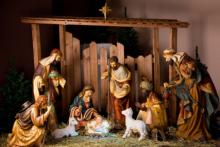
Nine in 10 Americans will celebrate Christmas this year, but a new poll shows that increasing numbers see the holiday as more tinsel than gospel truth.
This year more than ever, Americans prefer that stores and businesses welcome them with the more generic “Happy Holidays” or “Season’s Greetings” than “Merry Christmas,” according to a survey released Tuesday by the Public Religion Research Institute in partnership with Religion News Service.
And for one in four American adults (26 percent), Dec. 25 is simply a cultural holiday, not a religious holy day.

As we prepare for the coming of Christ, the third Sunday of advent is celebrated in joy. As followers of Christ, it is reasonable to be exuberant about the birth of our Savior. The amount of happiness that can seep from the soul in response to a virgin birth, a perfect baby boy, and an adorable scene of livestock and shepherds befriending God’s family is immeasurable. Christmas music, Christmas decorations, and yes, even Christmas presents add to the joy and never fail to put a smile on my face.
This past weekend, as I tried to reflect on what it means to be joyful in Christ, my heart was temporarily hardened as I attended a Reentry Arts & Information Fair for returning citizens. I helped host a table for Becoming Church and their Why We Can’t Wait initiative.

Have you ever given someone a gift knowing that person probably wasn’t going to keep it? You had no idea what to give, so you gave something — a sweater, let’s say, even though you knew the recipient had more than enough sweaters — along with a gift return receipt.
That’s kind of how God gives, isn’t it? No, no, not the sweater part. The part about giving and then letting the others choose what they’ll do with the gifts.
Isn’t that how God gives to us?
And if we’re to be like God, shouldn’t we be giving the same way?
This is a challenging question, but one that’s relevant at this season of giving. Do we give with no strings attached? Or do we give with conditions? Do we give only to those we deem worthy?
With just a few days to go before Christmas, many Americans will be rushing around completing their Christmas preparations: doing their last minute shopping, finalizing travel plans, figuring out how to deal with awkward family dynamics. In many cases, they will be faced with what is popularly known as #firstworldproblems — problems of inconvenience of a privileged and affluent people: delayed flights, out-of-stock gift items, spotty cell phone coverage.
At the same time, many people, hidden amidst the consumer celebration that Christmas has become, will be struggling just to find their next meal, shelter, community, and hope.
Striking census bureau statistics released earlier this year paint a picture of an expanding American underclass, with 15% of Americans living at or below the poverty-line, 23% of children (the highest percentage of poor by age) living in poverty, and the evaporation of the American middle class.
On the one hand, at this time of year, our society is more aware of the poor. Holiday food collections, toy and clothing drives abound, as does the ubiquitous ringing of Salvation Army bells. And yet, in many ways the plight of the poor is more hidden by the bright lights and rush of the season.